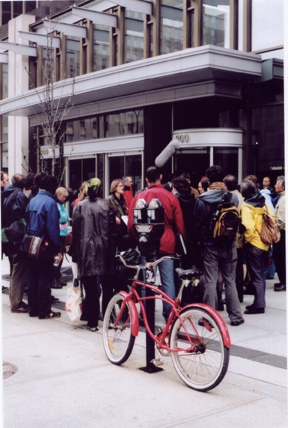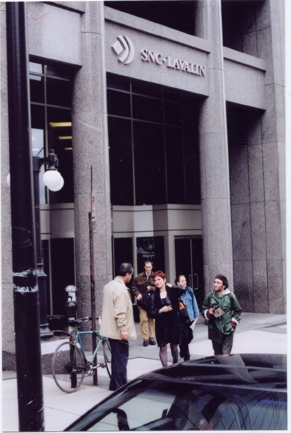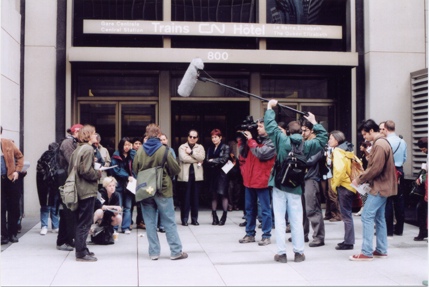{ Serai interviews a member of Block the Empire. }
* * * * * * * *
Block the Empire defines itself as a campaign "of creative resistance and direct action to expose and disrupt local participation in the systems of capitalism, patriarchy, colonialism and racism which produce and depend on the destructive militarization we are experiencing today - right here in Montreal." They dare to ask the question: "How does American Empire function locally?" And they aim to "shine a light there" on the who of empire, the what, the where and the how of it. Montreal Serai spoke with Mary Foster from Block the Empire.
Mary, how did Block the Empire first get started?
In January of last year it started with a desire for stronger action against
what seemed impending action against Iraq. 
Do
you have any particular ideology?
Personally I don't like ideologies; they tend to be static and dogmatic. BTE doesn't have an ideology but rather an on-going dialogue framed by two things: an anti-authoritarian stance that tries to understand oppression in all its forms, and a belief that the system and state we're in now is connected to longer term processes. It seems clear to us, for example, that the European colonization of North America is historically and systematically connected to the invasion of Iraq.
How would you describe Canada's relationship to the US?
Very close.
What do you anticipate Paul Martin is going to do for Canada?
Well last spring in statements on missile defense in Canada he promised open co-operation between Canada and the US. And then one of the first things he did in office was to make David Pratt Minister of Defense.
He does have an unfortunate name.
Pratt? Yes and it's not just his name, he's been very pro the Iraq war. So his appointment sent out quite a strong message. But in fact I don't see Martin as a very great departure from Chretien in certain ways. The Defense Research Establishment in Ottawa are already in the process of developing space-based technology for the missile defense programme and there have been many US/Canadian discussions regarding a global land, sea and space-based system, enabling immediate, preventative strikes against any threats to US and allied interests. The US has already tried out some of this "defensive" technology in Iraq and Afghanistan.
What is the relationship between the state and the military industry in Canada?
The arms industry is catered for by the likes of Technologies Partnership Canada, an office within Industry Canada that offers very soft loans to hi tech companies that, by and large, produce for military purposes. The Canadian Commercial Corporation (a government organization) networks and brokers for overseas exports. The Canadian Defense Industry Association (CDIA) and broader coalitions of capitalists too, such as the Canadian Council of Chief Executives (formerly BCNI) lobby the government for increased military spending, greater co-operation with the US and an environment that favors spending on military and security technologies.

Who
does the Council of Chief Executives count among its ranks?
Main military industry leaders such as Derek Burney, President and Chief Executive Officer of CAE is on the executive committee of the CCE. CAE is Canada's largest military company, in the world's top one hundred and a prime contractor to the Pentagon. Burney announced in 2002 that CAE was joining the Ballistic Missile Defense project, contributing the development of sensors, interceptors and command and control systems, helping the Bush administration towards "full spectrum dominance" over the world. So it seems that in many ways Martin is just here to formalize and legitimize Canada's already existing relationship with the US. Of course, all this militarization comes with promises of complete security.
And their headquarters is here in Montreal? Then why don't I sleep nights?
Perhaps the prospect of weapons in space, nuclear powered systems orbiting the world and an arms' race in space? Perhaps because preventive attacks and military and economic domination, in which Canada is participating, do tend to provoke retaliation. Perhaps because our real security needs and the real security needs of millions around the world - secure access to basic human needs such as food, shelter, freedom from fear, and a future - are not being met.
So what have been some of your most creative actions?
Last spring we organized a bus tour to 5 different military industries in
the Montreal area as well as the offices of Industry Canada, which houses
the Technologies Partnership Canada (TPC) program. At each stop we briefed
participants about the involvement of the company or government office in
the arms trade, and invited someone to speak from a country where the weapons
were used. We also showed brief videos on the bus from an arms' fair in Ottawa
in between stops. We conducted "guerrilla workshops" as well, in
the main shopping district in Montreal, involving groups active on Iraq, Palestine,
Mexico, Argentina giving presentations which made the links between militarization
and the WTO's free trade agenda. At each stop we set up a little theatre with
portable chairs and invited passers-by to join the discussion.
What was the creative resistance aspect to all this?
We were trying to force different relations into this shopping district other than those of the consumer. We were inviting people to relate to each other as members of the same political and economic system, inviting them to consider what that means.

You were trying to provoke shoppers into making those connections. Did you succeed in engaging any on those terms?
People
enjoyed the guerrilla theatre about Mexico, Argentina in particular, because
there was that element of being entertained. You never know what's going to
happen though. As we were departing it became very lively. The army was conducting
a recruitment drive outside the Recruitment Centre and there were stationary
tanks in the street with little kids clambering on them. Many interesting
dialogues ensued between participants and the army. Whilst at the same time
some of our members were standing by holding pictures of people who'd died
in Iraq. And all the while there was a wedding going on in the background.
Then the police turned up and asked us to move along - which we did.
I'd say that's verging on the surreal. Can you tell us finally what's coming up?
February 5th at McGill, BTE along with Big Noise Tactical are showing The Fourth World War, a film showing resistance to capitalist globalization in many of the world's conflict zones.
In the publicity Naomi Klein says it's "as beautiful and global as humanity itself".
And then on 13th March along with No-one's Illegal we're organizing another Teach In entitled, "Words are weapons: No war at home, no war for empire." That's in readiness for 20th March, the anniversary of the invasion and another Global Day of Action against the occupation in Iraq and terror legislation.
Thanks Mary. That's great.
Thank you.